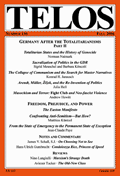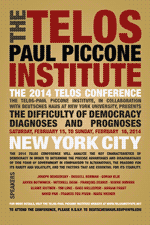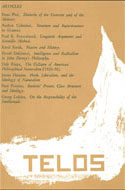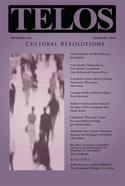By Lewis West · Friday, March 13, 2015  Catastrophic history does not free society: it allows the individual no exit from an endless spiral of destruction. Such destruction promises liberation for some, but it only tilts the world closer to ever-greater annihilation. To place one’s hope in redemptive violence constitutes a leap into the absurd. It is an act of pure faith. This is how Julia Hell, in her essay “Remnants of Totalitarianism: Hannah Arendt, Heiner Müller, Slavoj Žižek, and the Re-Invention of Politics,” reads the apocalyptic politics of Müller and Žižek. Hell frames her critique with a rigorous practicality: she laments Žižek’s “empty terms,” and likewise she sees the political writings of Giorgio Agamben and Judith Butler as hopelessly vague (103). Yet Hell’s rejection of Müller and Žižek does not reflect an entirely pragmatic method. While Hell insists on the need for a usable, specific politics, her attentive readings of each thinker also point to a vast philosophical disagreement. In the end, the true debate is not over the applications of theory. It is instead over the answer to a single question: what is the relationship of politics to death? Catastrophic history does not free society: it allows the individual no exit from an endless spiral of destruction. Such destruction promises liberation for some, but it only tilts the world closer to ever-greater annihilation. To place one’s hope in redemptive violence constitutes a leap into the absurd. It is an act of pure faith. This is how Julia Hell, in her essay “Remnants of Totalitarianism: Hannah Arendt, Heiner Müller, Slavoj Žižek, and the Re-Invention of Politics,” reads the apocalyptic politics of Müller and Žižek. Hell frames her critique with a rigorous practicality: she laments Žižek’s “empty terms,” and likewise she sees the political writings of Giorgio Agamben and Judith Butler as hopelessly vague (103). Yet Hell’s rejection of Müller and Žižek does not reflect an entirely pragmatic method. While Hell insists on the need for a usable, specific politics, her attentive readings of each thinker also point to a vast philosophical disagreement. In the end, the true debate is not over the applications of theory. It is instead over the answer to a single question: what is the relationship of politics to death?
Continue reading →
By Carlos Gasperi · Friday, May 9, 2014 The following paper was presented at the Eighth Annual Telos Conference, held on February 15–16, 2014, in New York City.
 In the following, I address the question of Venezuelan democracy under the fourteen-year mandate of recently deceased President Hugo Chávez from the philosophical perspective of Karl Marx’s The Eighteenth Brumaire to Louis Bonaparte. Recent Latin American history of the past twenty years has seen a resurgence of leftist governments sympathetic to Cuba’s Marxist revolutionary ideals of the 1960s, where Venezuela is no exception. Focusing on one particular event in Venezuela’s contemporary history, I wish to accomplish two things. The first is to convince my audience that Nicolás Maduro’s inauguration ceremony of his then newly appointed presidential cabinet in late-April 2013 is the sharpest expression of the current failed state and non-direction of Chavismo in Venezuela, or more precisely, what I call the dissolution of its sensus communis. Second, I wish to advance a philosophical question for discussion among audience members, namely, does replicating a historically prior political ideology ever secure success for democracy within present historical circumstances; more succinctly, in other words, do anachronistic political experiments produce volatile democracies? In the following, I address the question of Venezuelan democracy under the fourteen-year mandate of recently deceased President Hugo Chávez from the philosophical perspective of Karl Marx’s The Eighteenth Brumaire to Louis Bonaparte. Recent Latin American history of the past twenty years has seen a resurgence of leftist governments sympathetic to Cuba’s Marxist revolutionary ideals of the 1960s, where Venezuela is no exception. Focusing on one particular event in Venezuela’s contemporary history, I wish to accomplish two things. The first is to convince my audience that Nicolás Maduro’s inauguration ceremony of his then newly appointed presidential cabinet in late-April 2013 is the sharpest expression of the current failed state and non-direction of Chavismo in Venezuela, or more precisely, what I call the dissolution of its sensus communis. Second, I wish to advance a philosophical question for discussion among audience members, namely, does replicating a historically prior political ideology ever secure success for democracy within present historical circumstances; more succinctly, in other words, do anachronistic political experiments produce volatile democracies?
Continue reading →
By Matt Applegate · Thursday, March 13, 2014 As an occasional feature on TELOSscope, we highlight a past Telos article whose critical insights continue to illuminate our thinking and challenge our assumptions. Today, Matt Applegate looks at Paul Piccone’s “Students’ Protest, Class-Structure, and Ideology” from Telos 3 (Spring 1969).
 Paul Piccone’s 1969 essay “Students’ Protest, Class-Structure, and Ideology” captures the revolutionary ethos of that time in the United States. Hippies, student politics, Black Power, as well as the work of such figures as Régis Debray and Herbert Marcuse all come under Piccone’s earnest critical consideration. His primary concern, however, is the link between these student revolts and the state of education in the United States. On the one hand, Piccone is intent on charting the means by which hyper-industrialization and the technologization of work lead to open student rebellion. On the other, he is interested in understanding why student rebellion is effective in relation to other forms of revolutionary organization that appear alongside it. Paul Piccone’s 1969 essay “Students’ Protest, Class-Structure, and Ideology” captures the revolutionary ethos of that time in the United States. Hippies, student politics, Black Power, as well as the work of such figures as Régis Debray and Herbert Marcuse all come under Piccone’s earnest critical consideration. His primary concern, however, is the link between these student revolts and the state of education in the United States. On the one hand, Piccone is intent on charting the means by which hyper-industrialization and the technologization of work lead to open student rebellion. On the other, he is interested in understanding why student rebellion is effective in relation to other forms of revolutionary organization that appear alongside it.
Continue reading →
By Artemy Magun · Tuesday, March 11, 2014 The ongoing take over of Crimea by Russia, and its intense political campaigning to annul the results of the Kiev revolution, took most observers of international politics by surprise. Normally, one has not been considering Russia as a serious contender of the United States for hegemony, as a country with serious economic or military resources, or even as a country with a particularly serious ideology. American and European political science has for decades been busy with “transitions to democracy” and the evaluation of their relative successes (even though there is a recent shift toward the study of authoritarianism), and in International Relations, China seemed to be the only possible opponent to U.S. unilateral hegemony. European Studies examines the various neighborhood policies of the European Union, measuring their relative success in “democratization.” The U.S. and European leaders therefore reacted to the events in Russia and Ukraine with surprise: John Kerry spoke of Russia’s “nineteenth-century behavior,” and Angela Merkel described Putin as being delusional, living “in another world.” This correctly describes the huge discrepancies in worldviews and values, but the views and values of Russian leadership, whether delusional or not, have very real effects, and therefore represent a repressed part of the reality about which the Western leaders do not want to think.
Continue reading →
By Russell A. Berman · Monday, June 24, 2013 Telos 163 (Summer 2013) is now available for purchase in our store.
 Profound change in society may involve shifting control of political power, the character of economic systems, or access to resources, but it can also have to do with the structures of meaning we bundle together in various understandings of culture. This issue of Telos looks at the explosive forces located specifically in the intangible dimensions of culture and how they may play out in revolutionary or counter-revolutionary processes. Profound change in society may involve shifting control of political power, the character of economic systems, or access to resources, but it can also have to do with the structures of meaning we bundle together in various understandings of culture. This issue of Telos looks at the explosive forces located specifically in the intangible dimensions of culture and how they may play out in revolutionary or counter-revolutionary processes.
Continue reading →
By Gabriel Noah Brahm · Friday, February 25, 2011 In her 1963 book, On Revolution, Hannah Arendt wrote poignantly of the “revolutionary tradition and its lost treasure.” What was this trove of priceless gems and relics, with a noble pedigree few are aware of and without a name? Why was it lost? And what’s this got to do with the events of January-February 2011 in Egypt?
Continue reading →
|
|
 Catastrophic history does not free society: it allows the individual no exit from an endless spiral of destruction. Such destruction promises liberation for some, but it only tilts the world closer to ever-greater annihilation. To place one’s hope in redemptive violence constitutes a leap into the absurd. It is an act of pure faith. This is how Julia Hell, in her essay “Remnants of Totalitarianism: Hannah Arendt, Heiner Müller, Slavoj Žižek, and the Re-Invention of Politics,” reads the apocalyptic politics of Müller and Žižek. Hell frames her critique with a rigorous practicality: she laments Žižek’s “empty terms,” and likewise she sees the political writings of Giorgio Agamben and Judith Butler as hopelessly vague (103). Yet Hell’s rejection of Müller and Žižek does not reflect an entirely pragmatic method. While Hell insists on the need for a usable, specific politics, her attentive readings of each thinker also point to a vast philosophical disagreement. In the end, the true debate is not over the applications of theory. It is instead over the answer to a single question: what is the relationship of politics to death?
Catastrophic history does not free society: it allows the individual no exit from an endless spiral of destruction. Such destruction promises liberation for some, but it only tilts the world closer to ever-greater annihilation. To place one’s hope in redemptive violence constitutes a leap into the absurd. It is an act of pure faith. This is how Julia Hell, in her essay “Remnants of Totalitarianism: Hannah Arendt, Heiner Müller, Slavoj Žižek, and the Re-Invention of Politics,” reads the apocalyptic politics of Müller and Žižek. Hell frames her critique with a rigorous practicality: she laments Žižek’s “empty terms,” and likewise she sees the political writings of Giorgio Agamben and Judith Butler as hopelessly vague (103). Yet Hell’s rejection of Müller and Žižek does not reflect an entirely pragmatic method. While Hell insists on the need for a usable, specific politics, her attentive readings of each thinker also point to a vast philosophical disagreement. In the end, the true debate is not over the applications of theory. It is instead over the answer to a single question: what is the relationship of politics to death?  In the following, I address the question of Venezuelan democracy under the fourteen-year mandate of recently deceased President Hugo Chávez from the philosophical perspective of Karl Marx’s The Eighteenth Brumaire to Louis Bonaparte. Recent Latin American history of the past twenty years has seen a resurgence of leftist governments sympathetic to Cuba’s Marxist revolutionary ideals of the 1960s, where Venezuela is no exception. Focusing on one particular event in Venezuela’s contemporary history, I wish to accomplish two things. The first is to convince my audience that Nicolás Maduro’s inauguration ceremony of his then newly appointed presidential cabinet in late-April 2013 is the sharpest expression of the current failed state and non-direction of Chavismo in Venezuela, or more precisely, what I call the dissolution of its sensus communis. Second, I wish to advance a philosophical question for discussion among audience members, namely, does replicating a historically prior political ideology ever secure success for democracy within present historical circumstances; more succinctly, in other words, do anachronistic political experiments produce volatile democracies?
In the following, I address the question of Venezuelan democracy under the fourteen-year mandate of recently deceased President Hugo Chávez from the philosophical perspective of Karl Marx’s The Eighteenth Brumaire to Louis Bonaparte. Recent Latin American history of the past twenty years has seen a resurgence of leftist governments sympathetic to Cuba’s Marxist revolutionary ideals of the 1960s, where Venezuela is no exception. Focusing on one particular event in Venezuela’s contemporary history, I wish to accomplish two things. The first is to convince my audience that Nicolás Maduro’s inauguration ceremony of his then newly appointed presidential cabinet in late-April 2013 is the sharpest expression of the current failed state and non-direction of Chavismo in Venezuela, or more precisely, what I call the dissolution of its sensus communis. Second, I wish to advance a philosophical question for discussion among audience members, namely, does replicating a historically prior political ideology ever secure success for democracy within present historical circumstances; more succinctly, in other words, do anachronistic political experiments produce volatile democracies?  Paul Piccone’s 1969 essay
Paul Piccone’s 1969 essay  Profound change in society may involve shifting control of political power, the character of economic systems, or access to resources, but it can also have to do with the structures of meaning we bundle together in various understandings of culture. This issue of Telos looks at the explosive forces located specifically in the intangible dimensions of culture and how they may play out in revolutionary or counter-revolutionary processes.
Profound change in society may involve shifting control of political power, the character of economic systems, or access to resources, but it can also have to do with the structures of meaning we bundle together in various understandings of culture. This issue of Telos looks at the explosive forces located specifically in the intangible dimensions of culture and how they may play out in revolutionary or counter-revolutionary processes. 






